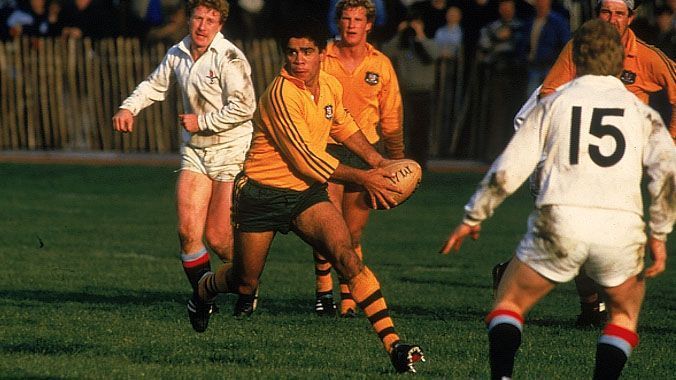Wallabies great Mark Ella needed to be persuaded to have his name as part of the new trophy to be contested by Australia and England from Saturday week, but he says it is a great honour and “probably time” that two former players were recognised.
Rugby Australia [RA] and the Rugby Football Union [RFU] on Friday confirmed the existing reports that the Cook Cup would be replaced by the Ella-Mobbs Cup, with the former Test fly-half honoured alongside Englishman Edgar Mobbs, who played in the very first rugby international between the two countries in 1909 and was later killed in World War I.
The decision to replace the Cook Cup, which the two countries had contested since the game turned professional in 1996, had drawn criticism in some corners.
But Ella says that while he personally had never taken any offence to the trophy being named after the colonial explorer, he agreed it was time the rivalry carried more suitable rugby personas.
“It means a lot to me and my family,” Ella told reporters in the middle of Coogee Oval, where he and his brothers Glen and Gary had run amok for Sydney club Randwick. “Obviously I’ve got a very good looking twin brother, and a younger brother, and we played a lot of our rugby here and it meant a lot to us over the years.
“I’m honoured that the Cup is now in my name, or in our name I guess – it’s a big honour.
“I understand the connotations [of the Cook Cup] and it certainly didn’t upset me. But to be fair it’s been around a long time, 25 years, and now it’s probably time to recognise the rivalry between the RFU and Rugby Australia, and what it means. And having two former players as part of the new Ella-Mobbs Cup, I think, is the way it should be.”
While the trophy is still getting its finishing touches before being unveiled ahead of the first Test in Perth next week, Ella did reveal one small feature of the new silverware, which has been designed by his niece, Natalie.
“Natalie’s a pretty good artist and she knows what we needed, [but] I made a couple of suggestions about mullet,” Ella explained. “That might sound funny to many people but my dad was a net fisherman and we caught mullet right throughout our summers, and Glen and Gary again played a big role in that.
“When you come from a family of 12, you don’t really have a lot to talk or argue about when food is put in front of you. So we had baked mullet, skinned mullet, mullet soup – any way you could eat mullet was the way it was.
“And even to this day there are [still] two people who call me ‘mullet’ and they are David Campese and Wally Lewis. They’re the only two people who call me mullet, so it’s lasted.”
With just a week away until the first Test, anticipation is building for what is a hugely important series for both sides, but particularly the Wallabies who haven’t beaten England since the 2015 Rugby World Cup.
At the helm of England for all eight of those victories has been Australian Eddie Jones, who has already attempted to take the heat off his touring squad by winding up the “aggressive” local fans and media.
Ella knows Jones’ tricks all too well.
“I’ll probably get to see Eddie in Perth before the first Test match, we’ve known each other since we were three years old,” Ella said. “We did kindergarten, primary school, high school [together]; I know my twin brother, Glen, and Eddie are as thick as thieves, and we’ll have a few laughs and giggles when I do catch up with him.
“Beaver [Jones], obviously playing with him on this field, he always had a sharp tongue and he didn’t hesitate in telling the referee or his opposition what he thought of them and we used to have a lot of fun having potshots at each other.
“I better not say too much; he might get the s—- with me.”
While there are no Indigenous players in Dave Rennie’s current squad, Ella is hopeful that this latest move from RA, which follows the creation of the Wallabies Indigenous jersey and the singing of the national anthem in the Eora language in 2020, will continue to inspire young Indigenous players to take up the game and follow in the footsteps of he, his brothers and, more recently, Kurtley Beale.
“I think it has to be both, there’s no way that I could just say that ‘Mark Ella deserved it’,” Ella said when asked whether the trophy was recognition of his legacy or Indigenous representation on the whole.
“In fact, I’m probably representing the Indigenous population, obviously we’ve had a lot of Indigenous players over the years, with the latest being Kurtley Beale. We’re proud of what we’ve achieved within rugby, and hoping that there is many more to come.
“They’re [Rugby Australia] doing their best; again like other sports it’s not easy. But as long as they don’t give up hope and believe that there is talent there and there [are] opportunities, that they’ll keep on trying.”
